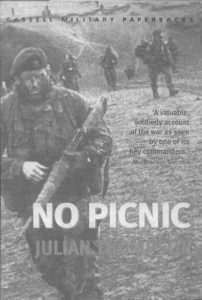- Author
- Book reviewer
- Subjects
- Book reviews, History - post WWII, Post WWII, Royal Navy, Naval Engagements, Operations and Capabilities
- Tags
-
- RAN Ships
- None noted.
- Publication
- June 2002 edition of the Naval Historical Review (all rights reserved)
Title: No Picnic – An Account of the 1982 Falklands War by
Author: Royal Marine Maj Gen Julian Thompson
Publisher: Cassell. ISBN: 0-304-35647-6

This book, a revised edition of a book first published in 1985, gives an authoritative account of the action on the ground during the Falklands War between Argentina and Great Britain in 1982, and fills that missing link in the many historical accounts of the campaign so far published. It gives a detailed and interesting insight into land operations by commando, paratroop and special forces.
The author, Major General Julian Thompson Royal Marines, was commanding 3 Commando Brigade at that time and designated commander land forces during the conflict.
The account opens with the author describing the inner workings of 3 Commando Brigade, which forms the major part of the combined United Kingdom/Netherlands Landing Force contribution to the Amphibious Forces of the NATO Alliance, and the dramatic call to deploy, in view of post campaign reports that Fleet Headquarters Northwood had received intelligence on the 31 March 1982 that the Falkland Islands would be invaded by Argentina on the 2 April.
This was one of many incidents throughout the book where Fleet Staff actions at Northwood were questionable, in particular the non-appointment of a theatre commander for the conflict, leading to some command difficulties between the Naval and Land components involved in the campaign.
As the story unfolds with 3 Commando Brigade and the Parachute Regiment landing on the Falkland Islands, the difficulties of trying to run the show from Northwood is clearly illustrated, when Fleet Staff give direction to the Naval Force to take up an anti-submarine defensive posture during landing operations, leading to some amphibious units being pulled out of the landing area, resulting in weapons being landed without ammunition in some instances. This also made a mockery of the careful planning of the 3 Commando Brigade logistics team, and indicated a lack of confidence in the ability of the people on the spot to make decisions that they had been trained for over many years. In spite of the difficulties encountered during landing operations, the professional qualities and fighting spirit of the troops made it a success.
The reader gets some appreciation of the rugged and inhospitable terrain of the Falkland Islands, when front line troops like the Marines and Paratroops would take several hours to traverse a distance that in the Brecon Beacons would take only minutes, during their advance on Stanley. However, this they did, dislodging a much bigger and heavily armed force on the way, by courage and fighting prowess. It was interesting to read that the soldiers’ boots leaked, after all that testing by the Ministry.
Throughout the campaign the author is under constant pressure from senior staff back at Northwood and in Whitehall to finish the campaign in short time, treating it like a skirmish, displaying a poor knowledge of the environment, which had they sought it, was available, and the standard tactical doctrine of the British Army. It would appear that recklessness by Northwood also leads to a near disaster for the troops on the ground, after classified tactical information is given to the BBC to announce to the World that a new forward position had been established on the mainland, giving the precise location. The Argentinians wasted no time in plastering the position with bombs, leaving many dead and wounded British troops.
The main and individual battles of the participants, tactics and hardships in this conflict are vividly conveyed and present an epic story. An excellent book, very well documented and good reading.




